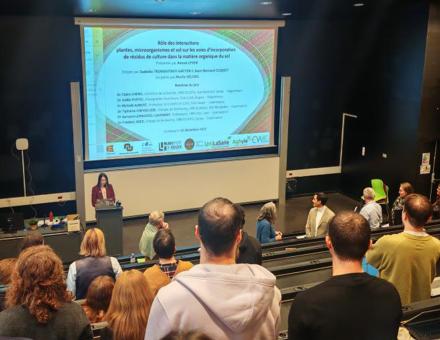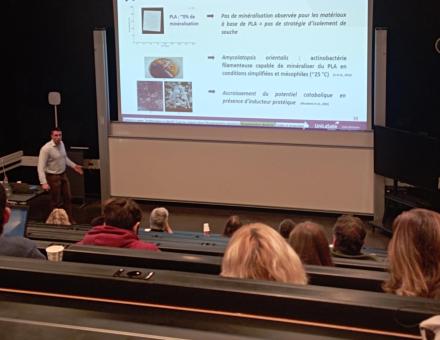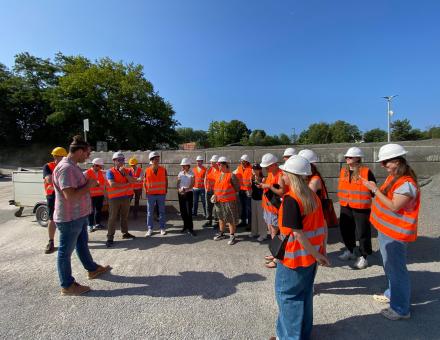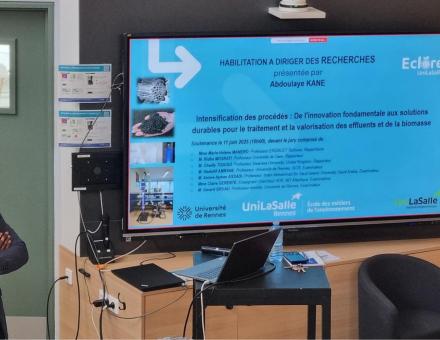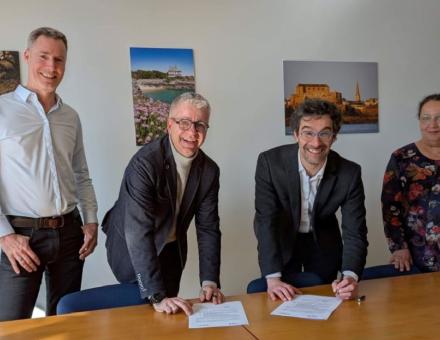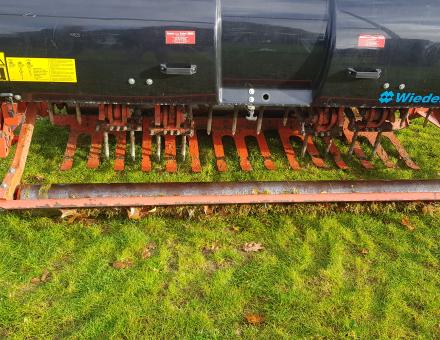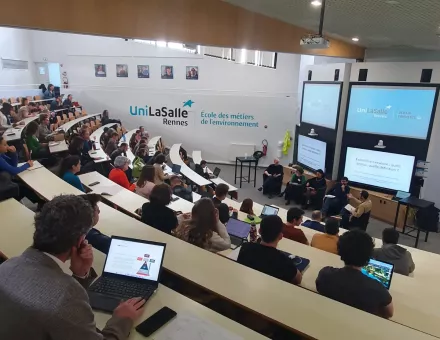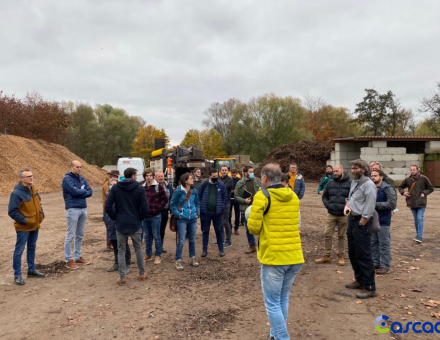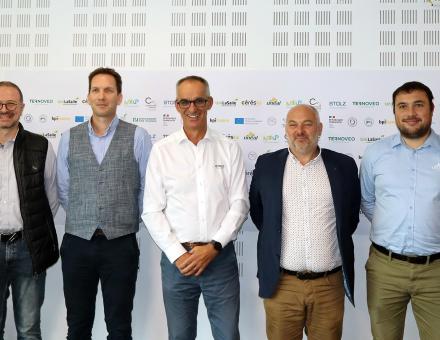The research carried out by the Transformations & Agroresources unit mainly concerns the food and non-food valorization of agro-resources.
- The PETALES team will focus on characterizing agro-resources during their transformation and the impact of these transformations on intestinal homeostasis following early exposure.
- The VAM²IN team aims to study the structural/functional relationships of bio-sourced materials and products for their non-food use.
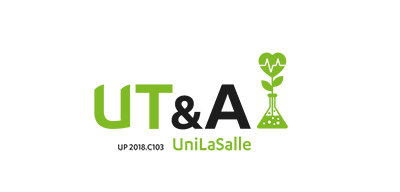
The scientific project
History of the unit
The Transformation and Agro-resources Unit is under the supervision of UniLaSalle, an engineering school in earth, life and environmental sciences, which was created in January 2016 from the merger between the Institut Polytechnique LaSalle in Beauvais and ESITPA in Rouen.
This Unit brings together the associate professor of the former EGEAL Unit (Gene Expression and Epigenetic Regulation by Food) in Beauvais, of axis 2 of the former AGRI'TERR Unit (Agro-ecology of Territories) in Rouen, and associate professor not previously associated with these former units (such as associate professors from the IUT of Béthune).
The unit's program focuses on the transformation and enhancement of the whole plant in a sustainable development perspective, from the study of the mechanisms of their construction to the study of their properties and functionalities during their final use, whether food and/or non-food. This unit is divided into 2 teams:
- PETALES team: Food processing and health effects;
- VAM²IN team: Non-food processing.
PETALES team (food processing and effects on health)
In the context of the use of agricultural raw materials in any agri-food process, the major transformation steps are likely to modify the molecular assemblies initially present by potentially generating new structures/assemblies and/or new compounds, absent from the product at the origin (i.e. neoformed compounds). All of these structures/molecules transit with or without modification through the digestive tract where they can exert their effects. Therefore, in order to apprehend these health effects within the framework of our scientific project, we have set up tools and methods aimed at :
1 - Characterize the agro-resources during their transformation
It is necessary to better take into account the quality of the initial raw materials selected but also to have a better control of the processes implemented. We evaluate the effects of heat treatments of the food matrix by characterizing and quantifying, mainly, the neoformed compounds appearing during this stage of processing:
- Characterize the potential impact of other types of food matrix transformation;
- Determine the factors of variability in the composition of unprocessed raw materials;
- To implement new dimensions of characterization allowing to apprehend changes in structure/conformation in the biopolymers present.
2 - To study the transformation of agro-resources on intestinal homeostasis following early exposure
The establishment and maintenance of intestinal homeostasis is a major element for health, and the positive and negative impact of consuming food, whether or not it has been processed, is a subject of study by our team. We are therefore evaluating the impact of assemblies resulting from processing and/or newly formed compounds on the establishment and maintenance of intestinal homeostasis. In this framework, the understanding of biological effects, molecular and cellular mechanics and the measurement of their potential impacts are based on the implementation of in vivo and in vitro models.
We focus on :
- Evaluate the impact of thermal and/or athermal transformation processes on molecular/molecular assemblies and their technological, organoleptic, sanitary and nutritional functionalities;
- Determine the origin and the impact of the variability of raw materials on the modifications observed during the transformation process;
- Establish the conditions for these molecules to affect the behavior of the different cells present in the intestinal sphere (viability test, growth, differentiation, gene expression, expression of epigenetic markers on cultures and co-cultures of cells in vitro);
- Estimate the impact of these molecules on intestinal homeostasis (animal models, characterization of physiological and molecular responses to exposure to the molecules studied).
VAM²IN team (developing innovative molecules and materials from agro-resources)
Today, manufacturers are being encouraged to develop innovative materials that are more respectful of the environment and health, in a constrained economic and regulatory context. To meet these expectations, the use of agricultural by-products as vegetable raw materials is an interesting alternative due to their abundance and renewable nature. In this context, the team contributes to the valorisation of the cultivated plant within the framework of an integrated approach for the development of territories. The approach targets the non-food valorization of agro-resources through their transformation into materials and the production of molecules of interest for later applications, within innovative sectors to strengthen the development of the bio-economy based on the skills of the newly formed team and its partners.
1 - Construction and functionalization of new bio-sourced materials
The research activities carried out contribute to the understanding of the assembly mechanisms of biopolymers extracted from agricultural resources and co-products, involved in the material development processes. The objective is to control the structure, functionalities and durability of the materials by exploiting the intrinsic specificities of biopolymers and by integrating new technologies (extrusion, RMX, steam injection compression, ozonation...) in processes for the elaboration of assemblies specific to these bio-sourced materials. The interactions between constituents and interfaces are key points in the understanding of these new assemblies (structure/properties relationship).
We focus particularly on :
- the role of the composition and structure of agro-resources in the characteristics of agro-materials after their implementation ;
- the impact of treatment processes and intrinsic properties of plant raw materials on molecular assemblies and their functionalities (chemical and physico-chemical interactions, physical performance and preferential affinities).
These experimental approaches will be associated with statistical modelling work.
2 - Deconstruction of agro-resources for the production of bio-sourced products
This research aims to better characterize and study the deconstruction phenomena of the different fractions (native and/or transformed polymeric assemblies) of plant biomass in order to control and optimize in particular the production of energy and/or molecules of interest such as synthons (reaction intermediates for green chemistry reactions).
The research work aims to propose the elucidation of the link between the interactions of the structural properties of lignocellulosic biomass and its ability to deconstruct by means of high-performance pre-treatments (physico-chemical, thermal, mechanical, etc.) using few or no chemical reagents. The pre-treatments envisaged must (and will have to) be environmentally friendly.
The deconstruction of agro-resources can also have different aspects with the study of the biodegradability of new assemblies but also the valorization of molecules obtained by biological degradation processes.
Teams
Permanent members of the unit
Food Processes and Transformations and Health Effects Team (PETALES)
Moderator : AUSSENAC Thierry
Co-host: BARBEZIER Nicolas
- ANTON Pauline (HDR): Associate professor Digestive physiopathology and food safety (CV HAL
- AUSSENAC Thierry (HDR) : Scientific Director Beauvais Campus (CV HAL)
- BARBEZIER Nicolas: Associate professor Molecular and Cellular Biology (CV HAL)
- BUCHE François: Associate professor Food Science and Technology (CV HAL)
- DELAYRE-ORTHEZ Carine: Associate professor Immunology and Pharmaco-toxicology (CV HAL))
- DEPEINT Flore: Associate professor Applied Nutrition (CV HAL)
- ILLNER Anne-Kathrin : Associate professor, Human nutrition, Public health, Epidemiology, Nutritional epidemiology, Health education (CV HAL)
- JOUQUAND Céline: Associate professor Industrial biochemistry, formulation and sensory analysis (CV HAL)
- LAGUERRE Jean-Claude: Associate professor Food Process Engineering, Thermal and Microwave Processes (CV HAL)
- MADEC Jean-Yves: Associate professor Animal Nutrition and Zootechnics (CV HAL)
- NESTORA Sofia: Associate professor Biotechnologies / bioprocesses (CV HAL)
- NIAMBA Narcisse : Associate professor, Statistics and biostatistics (clinical, epidemiological and biological data)
- REGNAULT Stéphanie : Associate professor Analytical biochemistry (CV HAL)
- RODRIGUEZ LOPEZ José Miguel: Associate professor Animal Physiology (CV HAL)
- LERIDON Céline : Research Analyst, Analytical Chemistry (CV HAL)
- RHAZI Larbi : Research Analyst, Analytical Chemistry, Molecular Biology (CV HAL)
- SARRON Elodie: Research Analyst, Microbiology (CV HAL)
- SHEHZAD Aamir: Associate professor, Food Processes (CV HAL)
- YOUNES Hassan : Associate professor (HDR), Nutrition, Prevention and Health Education, Pathologies with a nutritional component (CV HAL)
Team Valorization of Agro-resources in Molecules and Innovative Materials (VAM²IN)
Moderator: LEBLANC Nathalie
- ACHA Victor: Associate professor Biological Process Engineering, Nanotechnologies, Technologies of Biodetection (CV HAL)
- ANDRE Laura: Head of Methanization Platform, Research Fellow, Bioprocesses / Methanization (CV HAL)
- BACOUP Feriel : Associate professor Physicochemistry of polymers of biosourced materials (mini-CV) (CV HAL) professor Applied Chemistry and Resource Processing vegetal
- BAPTISTA Mallaury : Green chemistry process operator
- BESNIER Jean-Baptiste : Process and physico-chemical characterization engineer
- GATTIN Richard (HDR): Associate professor Agromaterials and biodegradability (CV HAL)
- HOANG Le Vinh : Research analyst, Process Engineering (CV HAL)
- LAKHAL Lyes : Associate professor Spectroscopy (CV HAL)
- LEBLANC Nathalie (HDR): Assistant Head of the Transformation & Agroresources unit, E/C Physicochemistry polymers, biosourced material sciences (CV HAL)
- MAREK Delphine: Associate professor Organic Chemistry - Chemistry of Agroresources
- RAGOUBI Mohamed: Associate professor Physical Sciences, Processes and Biosourced Materials, Head of the Agro R Tech Center, Head of the Valorization of the Rouen site. (CV HAL)
- TERRIE Caroline: Associate professor Physicochemistry of polymers and agromaterials (CV HAL)
- VESPIER-MORI Samantha : Biosourced materials implementation and characterization research technician
- ZMAMOU Hafida : Research associate, biobased materials chemistry. (CV HAL)
- JACOLOT Philippe: Study Engineer, Analytical Chemistry
- LERZY Benoit : Study Engineer, Microbiology
- MARIER David : Study Engineer, Microbiology
- BOROCH Camille : Technician, Research and Development in Zootechnics
- LEQUEUX Lucie : Laboratory technician
- RAME Véronique : Technician, Plant Biotechnology and Microbiology
Associate members (IUT d'Artois - Béthune) :
- CHAVERIAT Ludovic (MCU)
- LEQUART Vincent (MCU)
- JOLY Nicolas (PU)
- MARTIN Patrick (PU)
PhD students
Theses in progress
- SAKR Nada (2016 - 2020): Characterization of Lebanese soft wheat varieties: agronomic, biochemical and technological characterizations.
- Mehdi KHENNACHE (2016-2020): " Biological, chemical, physical and mechanical characterization of different batches of flax fibers transformed or not for an application in biosourced composite materials " industrial PhD co-directed UniLaSalle Angélique MAHIEU and MAP UMR 5262 Univ Caen Christophe POILÂNE),
- GUIBOURDENCHE Marion (2017 - 2020) - UPJV (Amiens): Impacts of a pesticide (CPF) and an obesogenic diet on fetal programming and the occurrence of obesity of metabolic disorders: in-vivo and in-vitro approach.
- HERNANDEZ SHEK Manuel Alejandro (2017 - 2020) - PhD CIFRE in Co-direction UTC / UniLaSalle - André PAUSS (UTC) and Thierry RIBEIRO (UniLaSalle): Identification of the optimal operating conditions of a dry process of METHANIZATION of Agricultural by-products in COntinu and COuloir (PROMETSCO).
- COUTU Arnaud (2017 - 2020) - PhD FEDER/SIAAP in Co-direction UTC / UniLaSalle - André PAUSS (UTC) and Thierry RIBEIRO (UniLaSalle) : Valorization of horse manure and sludge from wastewater treatment plants in mixture by methanization (VALOEQUIBOUE).
- MERCIER-HUAT Maël (2018 - 2021) - PhD CIFRE in Co-direction UTC / UniLaSalle - André PAUSS (UTC) and Thierry RIBEIRO (UniLaSalle) : Methanisation of shellfish by-products in pilot and laboratory reactors (METHACOQUE).
- Mazhar HUSSAIN (2019-2022) - " Valorization of sediment in biobased materials-application to fluvial sediments with incorporation of natural fiber " PhD Pakistan Grant co-directed UniLaSalle Hafida ZMAMOU and M2C Univ Caen Daniel LEVACHER)
- Maya DIAKITE (2019-2022) - "Influence of the parameters of the transformation processes undergone by plant matter: focus on the functionalities brought by temperature, pH and ozone" regional PhD - GoLaSalle co-directed by UniLaSalle Nathalie LEBLANC and IUT de Béthune Patrick MARTIN
- Désiré NDAHIRWA (2019-2022) - "Elaboration of eco-materials from biomass boiler ashes and vegetable aggregates. Relation structures - properties - behaviors " UniLaSalle PhD of the DIVA project directed by Nathalie LEBLANC)
- Thomas SANGO (2019-2022) - "Composite based on biosourced polymer matrix" (UniLaSalle PhD of the AMBIOS Chair co-directed by UniLaSalle Nathalie LEBLANC and UQAT Canada Ahmed KOUBAA)
Theses submitted :
- AL AMIR Issam (December 03, 2013) - UTC (Compiègne): Effect of Thermal Food Treatment on the Modulation of Digestive Inflammation.
- LOAEC Gregory (June 27, 2014) - UPJV (Amiens): Development of analytical methods for the analysis of acrylamide and MLC in roasted chicory as well as their precursor amino acid in chicory root. Evaluation of means for the reduction of these two neoformed compounds by varietal selection and choice of agricultural conduct.
- HELOU Cynthia (December 17, 2014) - AgroParisTech (Paris) : Maillard product content in bread depending on the quality of the raw material and the bread-making process. Effects of melanoidins in bread on the intestinal microbiota.
- GOZE Perrine (July 11, 2016) - UTC (Compiègne): Ozonation of soft wheat grains: study of the oxidation of major biochemical constituents.
- PEROT Maxime (03 October 2017) - UPJV (Amiens): Implementation and validation of nutritional strategies to reduce the risk of allergic responses.
- ANCELLET Laure (October 13, 2017) - UPJV (Amiens): Study of the effect of a process of enrichment in vitamin D by pulsed light on the quality of an ingredient.
- MRAD Fida (December 19, 2018): Decomposition of crop residues and biosourced materials: impact on microbial communities in agricultural soils and associated functions.
- ZMAMOU Hafida (2016 - 2019): ADEME PIA2 DIVA project (Industrial Demonstrators Valorizing Agro-residues in eco-construction and bio-renovation).
- Théo VINCESLAS (November 26, 2019): "Characterization of earth-hemp eco-materials taking into account the variability of locally available resources".
Research Projects
Current Projects
ALGRIPLAST project (2019 - 2023)
Objective
The aim of the Algriplast project is to develop new biodegradable plastic materials and finished products by adding value to by-products and co-products from agri-food production.
Challenges
Work will focus in particular on the search for new functionalities that can be provided by the use of these co-products and derivatives in plastics processing.
- Design of new bioplastic formulations based on biomass or derivatives.
- Development of new rigid, semi-rigid and flexible applications
- Control of service life by modulating biodegradation kinetics
- Setting up industrial processes for prototype production
- Study of environmental impact using life-cycle analysis.
Partners
- NaturePlast (coordinator)
- ALGAIA
- NOV'A Recherche (AGRIAL cooperative)
- UMR EVA - University of Caen
- UniLaSalle
Start date: 01/06/2019
Duration: 37 months
Funding: E.U. / Normandy Region
Overall project budget: €1.25 M
ExoAGEIng project (2019-2023)
Effects of early-life and chronic exposure to dietary AGEs on chronic low grade inflammation and age-associated disorders in response to the ANR 2020-2023 call for projects. The aim of this collaborative project is to understand the biological mechanisms by which perinatal or lifetime exposure to C-Carboxymethyl-Lysine in the diet contributes to the induction of chronic low-grade inflammation and non-communicable diseases.
Contact UniLaSalle : Carine DELAYRE
REACT project (2019-2022)
Objective
Develop recyclable and/or compostable barrier packaging to replace current multilayer films that are incinerated (44%) or landfilled (56%).
This project is financed by the European Union and the Normandy Region.
Issues
The multilayer film market represents 50% of the global market for flexible packaging, which alone generates 10MT of waste per year in Europe, or 36% of plastic waste.
Fossil-based multilayer solutions meet the requirements imposed by packaging applications, but their complex structure (assembly of different polymer layers) makes them non-recyclable, while bio-sourced solutions do not today offer all the properties such as barrier, mechanical characteristics, transparency, bacterial safety and sealability.
The main challenge of the project is to lift these locks while keeping recyclability and/or compostability in the spirit of the circular economy. From an economic point of view, REACT aims to set up in the Normandy region of France, a sector allowing the design, production and recovery of recyclable and/or compostable barrier plastic packaging.
Partners
IPC (coordinator) - UniLaSalle - University of Rouen - PBS - Praxens - ISPA Entreprise - Polytechs SA - Bischof + Klein France SAS (B+K)
Launch date: 01/06/2019
Duration: 37 months
Funding agency : E.U. / Normandy region
Overall Project Budget: €2.6 M
Ozone2020 project (2016-2022)
Ozone, whose effectiveness has been demonstrated in various industrial applications, is still little used in the agro-industrial sector. However, the increasing health requirements impose a continuous improvement of food preparation methods. The FUI Ozone 2020 project is part of this dynamic, anticipating and responding to the key challenges of food quality/safety. Based on a partnership model uniting different academic/industrial specialists (Actalia, Bonduelle, Etia, Suez Environnement, UniLaSalle), the Ozone 2020 project aims to develop and deploy two applications to reduce the biological contamination of plant-based products. This project initially targets divided dry products and ready-to-use raw plants.
Contact: Thierry AUSSENAC
Projet VALOEQUIBOUE (2018-2022)
The project VALOEQUIBOUE - VALOrisation of EQUIns manure and MUD from mixed waste water treatment plants by methanisation, is led by UniLasalle, the Université de Technologie de Compiègne and the SIAAP-DDP and is part of the MOCOPEE programme MOdélisation, Contrôle et Optimisation des Procédés d'Epuration des Eaux, 2nd phase (2018-2022).
The anaerobic digestion of equine manure coupled with the anaerobic digestion of WWTP sludge is a major issue to valorize these resources. This anaerobic digestion of equine manure and WWTP sludge in mixture, called co-digestion, has a strong biogas production potential and a high added value at the energy, agronomic and economic level. The project is divided into several tasks carried out within the framework of Arnaud COUTU's PhD: i) pre-treatment of horse manure by ozonation and other innovative technologies to improve anaerobic digestion; ii) biodegradation by wet anaerobic digestion of horse manure; iii) definition of operating parameters (hydraulic residence time, temperature, agitation, applied load, single or sequenced reactor, ...); iv) co-digestion with sewage treatment plant sludge and possibly other resources.
Contact: Thierry RIBEIRO
Project Equipment Chair AMBIOS and Msc AgRs, logistics & Biobased Materials (2017-2021)
Acquisition of high-tech equipment corresponding to the first phase of the creation of the "AgroRessources & BioSourced Materials for the Building Industry" chair. The objective is to associate companies from upstream (managing the availability of deposits and the first transformation of plant raw materials) and downstream (biosourced building industry).
Partners: ESITC, ISEL, ENSA, ECAM, ParexGroup, Karibati, Ecotechnilin, CapSeine, Nov&atech, Terre de lin.
Contact: Mohamed RAGOUBI
BIO-PAWVAL project (2020-2023)
Designing Bio-based and biodegradable Packaging through Agriculture Waste Valorization .
Objective
The project focuses on the exploration of locally available agro-resources such as starch, flax, etc., for the design of biosourced and biodegradable packaging.
Partners
National Institute of Food Science and Technology, University of Agriculture Faisalabad, Pakistan.
Contact: Aamir SHEHZAD
ADAGIO project (2020-2023)
Objective
In recent years, new requirements dictated not only by consumers, but also by processing and distribution professionals, have put the development and sustainability of the meat industry at risk.
Changing regulations and consumer demands are forcing us to rethink animal feed without incurring additional costs.
The ADAGIO project proposes to create and demonstrate the impact of a nutritional solution to promote the development of intestinal mechanisms leading to good digestive health in livestock, particularly in the France-Wallonia-Flanders basin. This research could also lead to the development of food supplements for human consumption.
Partners
Sanluc International, GenoScreen, ALGOFIT, Ghent University
Contact: Nicolas BARBEZIER
Completed projects
CapsAntiOx project (2016-2019)
Microencapsulation of antioxidant molecules for the enrichment of food products. Project coordinated by the BMBI Unit of the UTC, supported by funding from the Conseil Régional des Hauts de France. UniLaSalle is a partner.
Contact: Pauline ANTON
ELEMENTA project (2014-2017)
Study of the effect of a vitamin D enrichment process by an innovative treatment on the quality of an ingredient. This research program aims to obtain a new ingredient enriched in vitamin D by confidential UV treatment. The objective is to characterize the impact of this treatment on commonly consumed food raw materials and to allow, subsequently, a marketing authorization. We are working on new raw materials, for which the process has yet to be proven in order to enrich them with vitamin D and limit the formation of undesirable neoformed compounds.
Contact: Céline NIQUET-LERIDON
NEONAL project (2013-2016)
Effects of neoformed compounds and pesticides in infants on the development of Allergies. Project carried out in partnership with the PERITOX_INERIS EA 4285 UMI 01 Laboratory and the ICAP platform of the UPJV, supported by funding from the Regional Council of Picardie. UniLaSalle is the pilot.
Contact: Carine DELAYRE-ORTHEZ
Projet ProtAlSafe (2013-2017)
The ProtAlSafe project is an FUI project labeled by the IAR and Valorial competitiveness clusters with the support of CRITT Santé Bretagne, led by the company Guaranteed Gluten Free (GGF) and involving several partners: ABCD Nutrition, Biofortis, the BIA unit of the INRA Angers-Nantes center and the EGEAL unit. This 3.7 million euro collaborative project started in January 2014 for a period of 3 years and aims to improve the living conditions of celiac patients through a validated and patented nutritional approach, consisting of gluten-free products associated with polymeric binders and symbiotics. A preclinical evaluation focuses on inflammatory parameters, pathophysiological characteristics and the intestinal microbiota. It is complemented by a clinical study aimed at validating the efficacy of the nutritional solution in celiac disease and its organoleptic qualities in patients.
Contact: Carine DELAYRE-ORTHEZ
Projet TIGRE (2016-2018)
Regional AND ERDF REGIONAL PROJECT (FIBER COMPOUNDING STruCTURE AND PLANT GRANULATES): This project aims to use agroresources to replace part of the materials derived from oil or materials whose production requires high energy consumption is a very promising option to fight against the scarcity of oil resources, environmental pollution by plastic materials and climate change.
Partners: LOMC UMR 6294 CNRS; Analyses et surface - Laboratoire Eric Beucher.
Contact: Nathalie LEBLANC
INTERREG VA Project France (Channel) England SB&WRC (2017-2019)
This project will develop new thermal insulation prototypes for the construction sector, using biosourced and waste raw materials.
Partners: Nomadéis Le Havre (Nomadéis); Ecole Supérieure d'Ingénieur des Travaux de Construction de Caen (ESITC Caen); University of Bath (UBath); University of Brighton (UoB); Construction 21 (C21); Veolia Propreté Nord Normandie (Véolia PNN); Alliance for Sustainable Building Products (ASBP)
Contact: Richard GATTIN
LIPS Regional Project (2015-2017)
(Integrated fight for the protection and the sanitary quality of plants): 2 theses in progress on the following topics: "Ecoproduction and valorisation of flax: ecoproduction against Fusarium oxysporum and impact on the properties of agromaterials" and "The characterization of exogenous organic matter: effects on the stability of the forms of carbon in agricultural soils. »
Partners: EA 4358 GlycoMev University of Rouen.
Contact: Richard GATTIN
ERDF MACHI Region Project (2017-2018)
This MACHI (Materials and CHIralities) project aims to prepare the materials of the future by anticipating the need for homochirality in different sectors ranging from molecular to macromolecular materials. The pharmaceutical and biological sectors have already highlighted the need to meet this need.
Partners: University of Rouen (SMS, AMME-LECAP, PBS-MPBM)
Contact : Nathalie LEBLANC
ERDF OLCO project (2016-2019)
The OLCO (Optimisation Lin Composite Flax) project aims to develop fundamental knowledge on the relationships between quality and agroresources properties and to develop and optimize the characterizations of the LSM flax fibre ribbons in response to the needs of the flax composite market.
Partners: Linière de Saint Martin.
Contact: Nathalie LEBLANC
Projet CHANVRISOL (2017/2018)
Re-deploy local supply chains for hemp-based building materials, if possible in short circuits, creating economic activity and jobs that cannot be relocated to rural areas. Lift, or contribute to lift, the administrative and technical obstacles identified at the local (Orne), regional (Normandy) and national levels, by adopting a "sector" approach.
Partners: Chanvriers en circuits courts; ECO-PERTICA; Association Régionale de Promotion de l'Eco-construction (ARPE).
Contact: Hélène LENORMAND
TIGRE project - Composite structures with fibers and plant GRranulates (2016-2020)
The European Union and the Normandy Region are contributing to the TIGRE project
STructures composItes à fibres et GRranulats vEgétaux
Objective: To study the plant-matrix elements involved in the development of biosourced composite materials in order to optimize the type of binder used and the implementation process according to the selected agro-resources.
From 1/09/2016 to 28/02/2020
Project duration: 42 months
UniLaSalle project budget: €338,554
Grants: €199,500
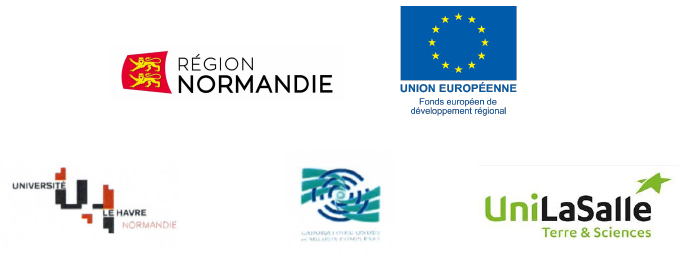
IMPALA project (2017-2020)
Impacts of a pesticide (CPF) and an obesogenic diet on fetal programming and the occurrence of obesity of metabolic disorders: in-vivo and in-vitro approach. Project coordinated by the PERITOX_INERIS EA 4285 UMI 01 Laboratory of the UPJV and supported by various regional funding sources.
Contact: Pauline ANTON
AAP ADEME GRAINE ECO-TERRA project (2016-2020)
Development of ECO-materials in TERRe-Lightened TERRITRE for high-performance ecological constructions: To understand the links between the variability of the constituents (plant aggregates and earth) of an earth concrete lightened by agro-resources and the physical properties of the mixtures, to develop resources from different territories. Environmental impacts will be quantified (LCA).
Partners: ECO-PERTICA; UniLaSalle; Université Bretagne Sud, LIMAT lab; Chanvriers en circuit court; IFSTTAR Bougenais; CEREMA; ARPE; LCDD
Contact : Hélène LENORMAND
PIA2 ADEME DIVA project (2016-2020)
DIVA Project (Industrial Demonstrators valorizing agro-residues in eco-construction and bio-renovation) : Structuring the bio-renovation and eco-construction sectors, from the production (harvesting, processing, supply) of plant raw materials (sunflower pith, corn and rapeseed, and their barks), to the implementation in old and new buildings.
Partners: PAREX Group; Ovalie Innovation; GDA Loches; La Dauphinoise; ENTPE; FLDI
Contact : Hélène LENORMAND
LENEFIN project (2020-2022)
Objectives: Creation of a fragrance based on the identification of olfactory molecules in flax, and development of new formulations for a secondary packaging combining performance, durability and aesthetics.
This project is funded by the European Union and the Normandy Region.
Challenges :
Enhancing the value of an emblematic regional plant as part of a short-circuit approach, and diversifying outlets for farmers.
Development of an eco-design approach in the luxury goods sector.
Partners: University of Rouen (SMS laboratory); Berry perfume house; Parfumerie Damiette; UniLaSalle (T&A research unit)
Launch date: 15/09/2020
Duration: 24 months
Funding: European Union and Normandy Region
UniLaSalle project cost: €251,404
